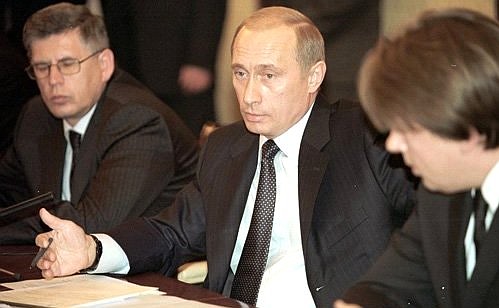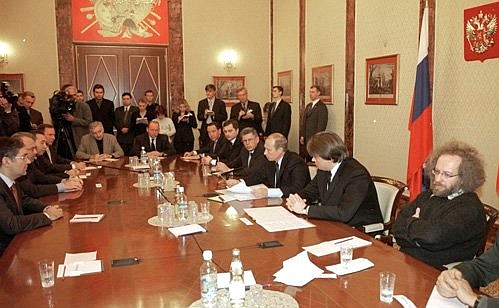During the meeting, the head of state said he had vetoed amendments to the law regulating the activities of the media in emergency situations.
Earlier, on November 20, the leaders of the media community had requested the President to veto the amendments that were adopted by the State Duma and approved by the Federation Council. The journalists promised to define rules of conduct in emergency situations that could lay the basis for a new version of the law on the media.
Mr Putin said he sent letters to Federation Council Speaker Sergei Mironov and State Duma Speaker Gennady Seleznyov in which he suggested setting up a conciliatory commission for developing amendments to the law on the media. The President said the legislators had to specify uniform rules of conduct in emergency situations for journalists.
The head of state thanked the media representatives for their civic stance and professionalism. At the same time, he called upon journalists to restrain from turning a terrorist attack into a public spectacle.
The President pointed to the need to settle the problem of the current laws on the media and terrorism. He said the law on terrorism specified the persons who were responsible for delivering information to journalists. Nevertheless, Mr Putin said, some journalists broke the law. Broadcasting the activities of the special forces several minutes prior to the hostage-release operation at the Dubrovka Theatre was a deliberate neglect of the agreements signed with the Press Ministry and instructions by the chiefs of the operations staff.
The participants in the meeting were Press Minister Mikhail Lesin, Deputy Chief of Staff of the Presidential Executive Office Alexander Surkov, Presidential Press Secretary Alexei Gromov, Federation Council First Deputy Speaker Valery Goreglyad, the leader of Regions of Russia parliamentary group, Oleg Morozov, Channel One director-general Konstantin Ernst, and VGTRK CEO Oleg Dobrodeyev, as well as editors of newspapers and other media.

